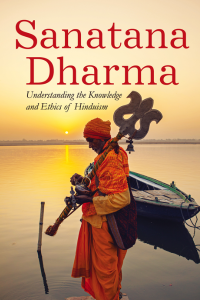Introduction to Sanatan Dharma
Sanatan Dharma, often referred to as Hinduism, represents the eternal way of life and the universal truth guiding humanity. Rooted in ancient scriptures like the Vedas and Upanishads, it transcends a mere religion, offering a spiritual and philosophical framework for self-realization and harmony.
Key Principles of Sanatan Dharma
- Eternal Truth (Satya):
Sanatan Dharma emphasizes truth as the highest virtue. It encourages seekers to align their actions with universal principles. - Dharma (Righteousness):
The concept of Dharma focuses on living a righteous and moral life. It varies based on individual duties (Swadharma) and universal ethics. - Karma and Reincarnation:
Karma refers to actions and their consequences, while reincarnation emphasizes the soul’s journey across lifetimes. - Moksha (Liberation):
Liberation from the cycle of birth and death is the ultimate goal, achieved through self-knowledge, devotion, and righteous living.
Scriptures and Practices of Sanatan Dharma
- Sacred Texts:
- Vedas: The foundational texts that contain hymns, rituals, and spiritual insights.
- Upanishads: Philosophical treatises exploring the nature of reality and the self.
- Bhagavad Gita: A guide to living a life of purpose, devotion, and detachment.
- Rituals and Worship:
- Emphasizes daily rituals like meditation, prayers, and offerings.
- Worship can be personal or community-based, centered on temples or home altars.
- Yoga and Meditation:
- Integral practices for attaining physical, mental, and spiritual balance.
The Relevance of Sanatan Dharma Today
Sanatan Dharma provides timeless wisdom applicable to modern challenges. Its focus on unity, compassion, and environmental harmony resonates universally.
Key Takeaways
- Universal Philosophy: A spiritual path embracing diversity and truth.
- Core Teachings: Dharma, Karma, and Moksha form its foundation.
- Relevance: Offers practical guidance for a balanced and meaningful life.
Sanatan Dharma’s teachings continue to inspire millions, reflecting its eternal nature and adaptability to changing times.





Reviews
There are no reviews yet.